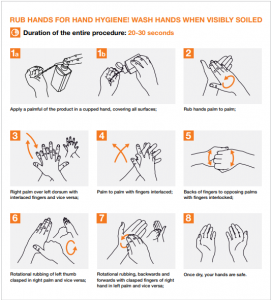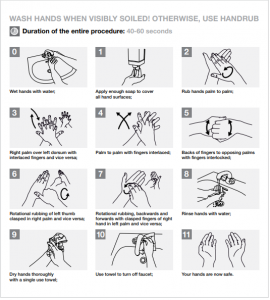Infectious diseases are one of the factors that affect a person’s nutritional status, both children and adults. Nutritional status has an influence on the immune system and the healing process. A person with a poor or even poor nutritional status is more at risk of developing various diseases and the healing time tends to be slower. Someone who is infected with an infectious disease needs more nutritional intake but has a problem, namely a decreased appetite. This can lead to weight loss and worsening nutritional status (Putri,2015).
Infectious diseases are also a common health problem in developing countries, including Indonesia. One of the causes of infectious disease is the lack of clean and healthy living habits in the family or home environment. Clean and healthy living behavior (PHBS) itself is a health behavior that is carried out with awareness so that family members can help themselves in the health sector and can play an active role in activities in the community. The implementation of PHBS is also an effort to transmit experiences regarding healthy living behaviors through individuals, groups, or communities using various communication channels as a medium for sharing information (Depkes, 2011). In broad terms, PHBS includes a movement to get used to healthy living behaviors. During this pandemic, clean living habits have become a necessity to minimize the risk of being infected with COVID-19. Not only that, but clean living habits can also prevent us from being infected with other infectious diseases. By adopting a clean and healthy lifestyle, our nutritional status and health will always be maintained.
For that, we need to adopt a clean and healthy lifestyle during this pandemic to prevent various transmissions from infectious diseases. World Health Organization (2021) suggest some behaviors we need to implement include:
- Wash your hands using soap and running water regularly
- Using the mask properly
- Avoid touching parts or areas of the face
- Cover mouth and hood using a tissue or the inside of the elbow when coughing or sneezing
- Clean and disinfect frequently touched surfaces, such as door handles, tables, chairs, cell phones, light switches
- Keep your distance and avoid crowds
- Ensure good air circulation
One of the clean and healthy living behaviors that we need to do is wash our hands. Washing hands needs to be done after coughing or sneezing, after using the toilet, after traveling outside, before preparing food, before eating, and when you feel your hands are dirty. Here are the steps to wash your hands properly (WHO, 2009):

(washing hands using a hand sanitizer’s guide)

(washing hands with soap and water’s guide)
In addition, clean and healthy living habits can be done by handling food ingredients properly so that the food we consume is guaranteed cleanliness. The following are various ways of handling food ingredients as a form of clean and healthy living habits (United Nations Children’s Fund, 2020), including:
– Wash hands before handling and preparing food
– Distinguish raw meat and fish cutting boards from vegetables and fruits to prevent cross-contamination
– Washing food, especially fruits and vegetables with clean running water
– Processing food at the appropriate temperature
– Store perishable foods in the refrigerator, check their expiration date periodically
– Use clean and dry cooking utensils and utensils
– Transferring food from outside to clean plates
– Dispose of food packaging in a closed trash can
– Clean the can with a clean cloth wrapper before opening it
References:
Departemen Kesehatan RI (2011) Pedoman Pembinaan Perilaku Hidup Bersih dan Sehat (PHBS). Jakarta:Depkes RI
Kementerian Kesehatan RI (2014) Pedoman Gizi Seimbang. Jakarta: Kementerian Kesehatan RI.
Putri, M. S., Kapantow, N., & Kawengian, S. (2015). Hubungan antara riwayat penyakit infeksi dengan status gizi pada anak batita di Desa Mopusi Kecamatan Lolayan Kabupaten Bolaang Mongondow. eBiomedik, 3(2).
United Nations Children’s Fund (2020) Cleaning and Hygiene Tips to Help Keep the COVID-19 Virus Out of Your Home. [Online] Available at: https://www.unicef.org/ [Accessed: April 1, 2021].
World Health Organization (2021) Coronavirus Disease (COVID-19) Advice for the Public. [Online} Available at: https://www.who.int/ [Accessed: April 1, 2021]
World Health Organization [2009) Hand Hygiene: Why, How & When? [Online] Available at: https://www.who.int/ [April 1, 2021]
Author: Fina Cahya Hasanah
